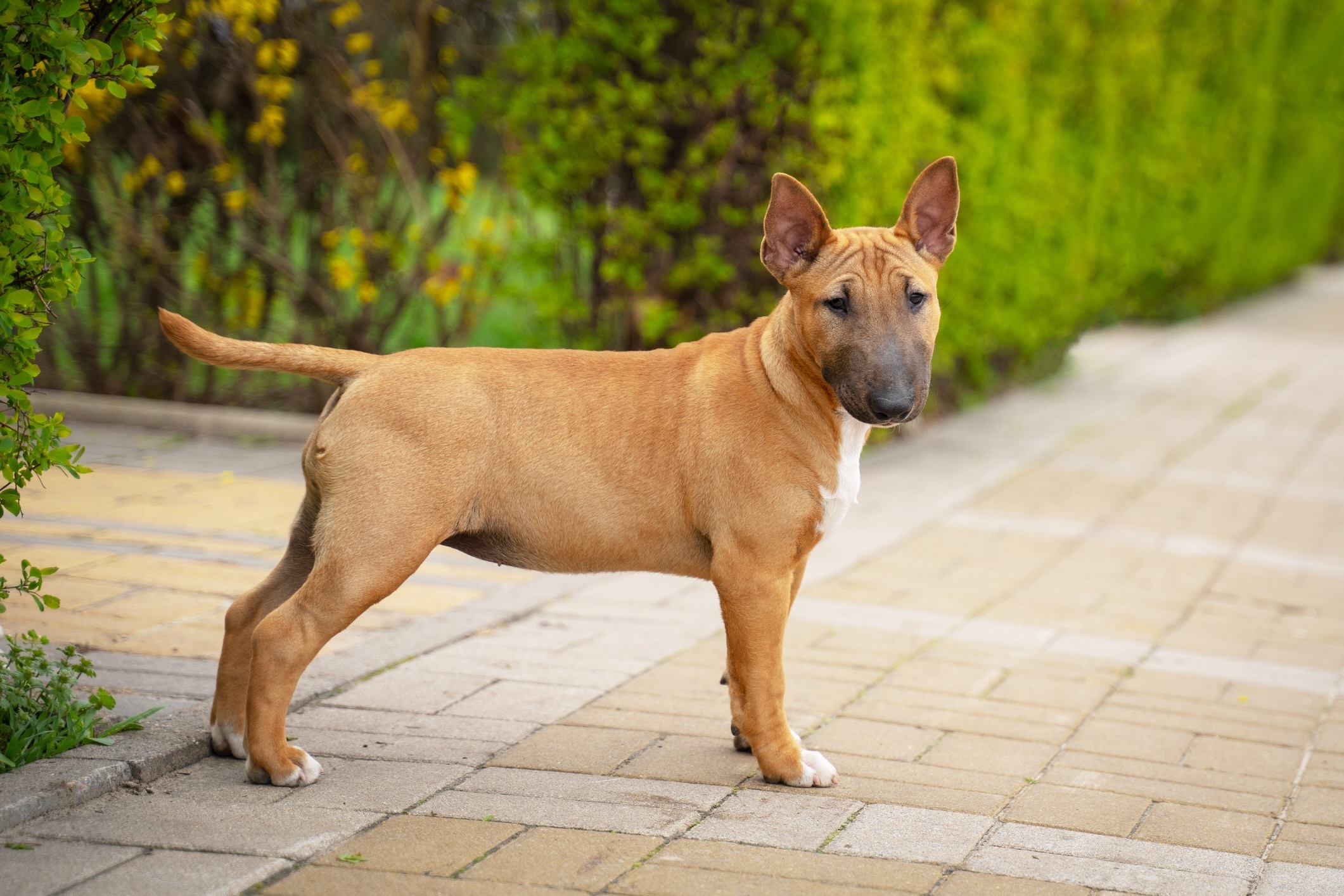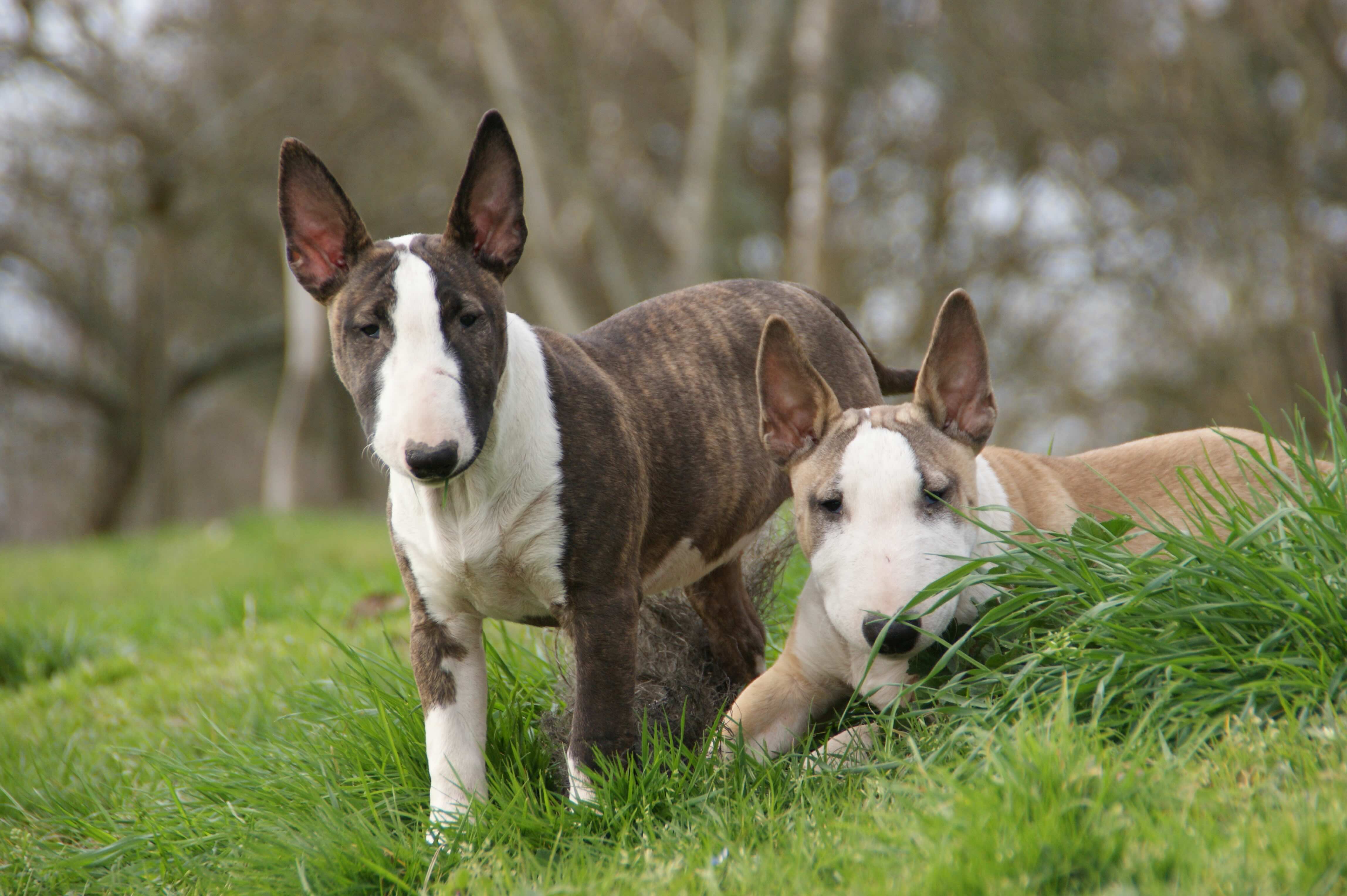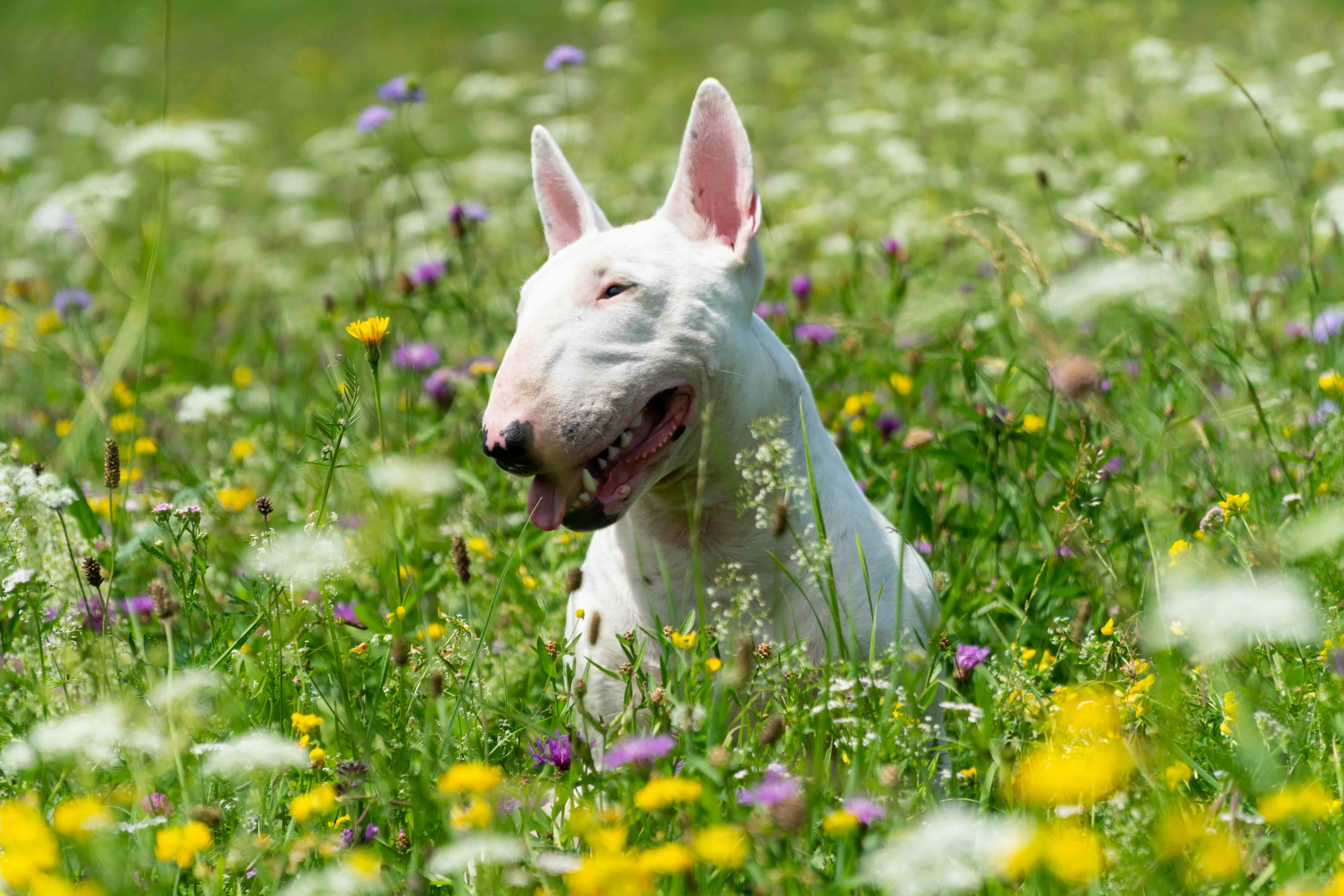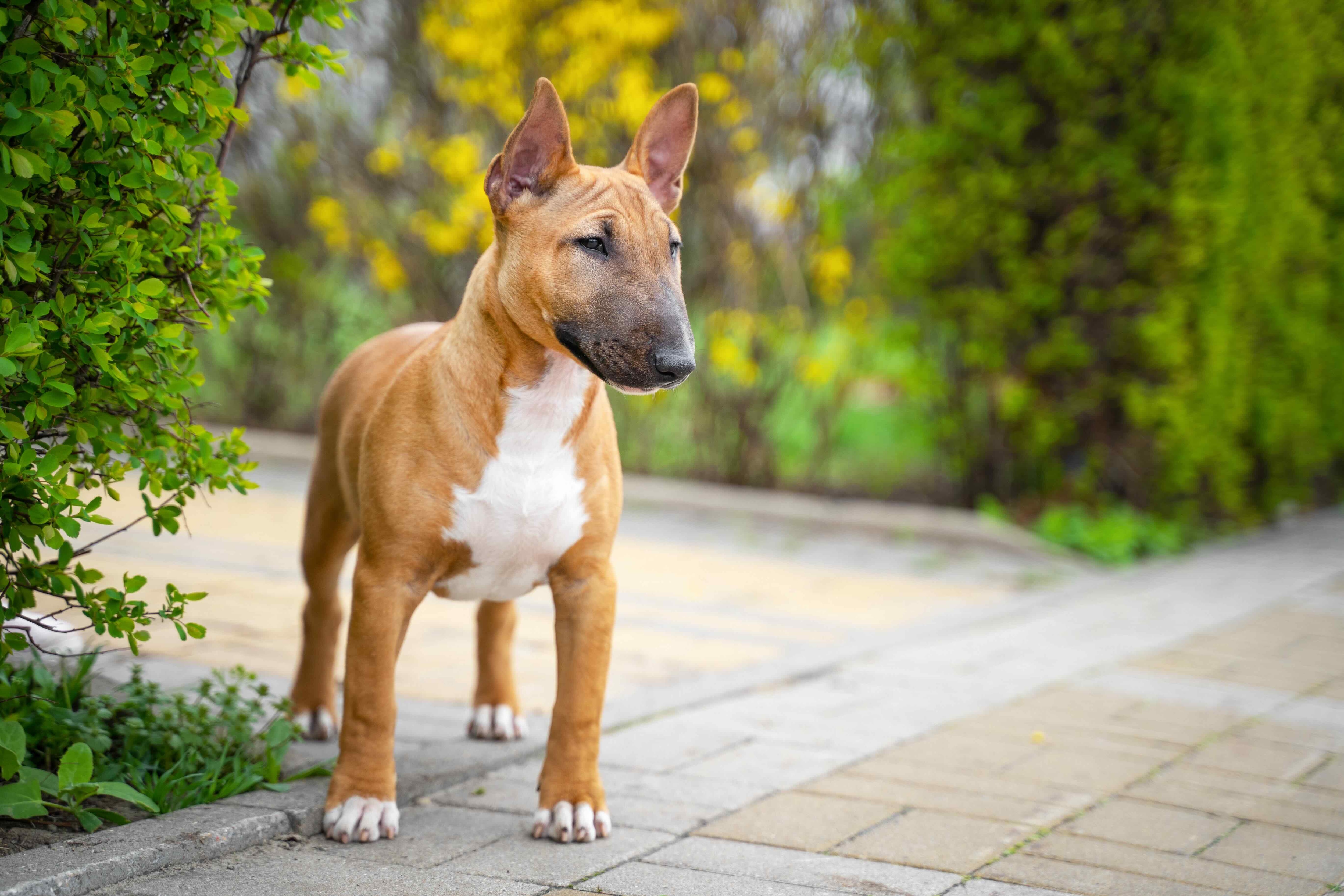Miniature Bull Terrier
cindygoff/iStock / Getty Images Plus via Getty Images
Miniature Bull Terriers are known for their spirited personality and distinctive appearance.
Originating in England during the early 19th century, the Miniature Bull Terrier was created by selectively breeding the larger Bull Terrier down to a smaller size. The dogs retain the same playful and determined nature as their larger counterpart, but in a more compact form.
Physically, the Miniature Bull Terrier is easily recognizable thanks to their egg-shaped head, strong jaw, and triangular eyes that give them an intense yet endearing expression. They have a short coat that comes in a variety of colors, including white, black, brindle, and a mix of these shades.
Mini Bull Terriers typically stand 10–14 inches at the shoulder and weigh 18–28 pounds. Despite their small size, these dogs are muscular and well-balanced, with a sturdy build that reflects their tenacious spirit.
Caring for a Miniature Bull Terrier
Miniature Bull Terriers can be good family dogs for the right pet parent thanks to their energetic, affectionate nature and their bold and playful personality. Like all dogs, they require regular exercise and mental stimulation to prevent boredom.
The Miniature Bull Terrier Club of America (MBTCA) refers to the breed as “3-year-olds in dog suits,” making them ideal for active households. While generally loyal and good with children, they can be willful, so training and socializing your Miniature Bull Terrier puppy is important.
Mini Bull Terriers are a breed that thrives with experienced pet parents who can provide consistent leadership, making them a lively and loving companion.
Miniature Bull Terrier Health Issues

Miniature Bull Terriers often lead healthy lives, with an average lifespan of 11–13 years. But they are predisposed to certain health issues, so regular veterinary checkups are important to catch problems early.
Pet insurance may be a good investment for pet parents of Miniature Bull Terriers.
Primary Lens Luxation
Primary lens luxation (PLL) is a serious genetic condition in Miniature Bull Terriers that can lead to sudden and painful blindness. This condition is caused when the fibers that hold the lens in place become damaged.
Symptoms of PLL in dogs include squinting, tearing, and/or red eyes. Talk to your veterinarian if you notice changes in your dog’s eyes or if it seems like your dog is in pain.
Deafness
Deafness is a significant concern in Miniature Bull Terriers, particularly those with a full white coat. This condition can be present in one or both ears and is usually apparent from a young age.
Regular hearing tests, especially for Miniature Bull Terrier puppies, can help with early detection. While deafness doesn't affect their overall quality of life, it does require special training and care to ensure your dog’s safety and well-being.
Heart Conditions
Miniature Bull Terriers are prone to heart issues, and mitral valve disease is one of the most common. This condition is when the heart's mitral valve doesn’t function correctly, leading to heart murmurs and, in severe cases, heart failure.
Keep up with regular wellness exams with your veterinarian, who will monitor your dog’s heart health for mitral valve disease and other problems.
Patellar Luxation
Patellar luxation, a condition where the kneecap dislocates or moves out of its normal position, is another common issue in the breed. This can cause discomfort, limping, and in severe cases may require surgery.
Keeping your Miniature Bull Terrier at a healthy weight can help reduce the risk of patellar luxation.
Kidney Problems
Hereditary nephritis (HN) and polycystic kidney disease (PKD) are serious health concerns for Miniature Bull Terriers that can lead to kidney damage. HN is detected via urine screening, and PKD requires a kidney ultrasound.
To address these issues, all MBTCA-member breeders must test their dogs for HN to reduce these conditions in future generations. Regular health checks, including a physical examination and lab work, are also important for early detection and management.
What To Feed a Miniature Bull Terrier

When choosing dog food for a Miniature Bull Terrier, prioritize high-quality protein sources, balanced fats, and moderate carbohydrates from whole grains and vegetables.
It’s best to talk to your vet about your dog’s nutrition. They can tailor the diet to your dog’s specific needs, health, and life stage. Any food you give your dog should meet the nutritional standards set by the Association of American Feed Control Officials (AAFCO).
How To Feed a Miniature Bull Terrier
Typically, adult dogs should be fed twice daily, once in the morning and once in the evening. Miniature Bull Terrier puppies may require three to four meals every day due to their higher energy needs, while senior dogs might benefit from smaller, more frequent meals to aid digestion. Talk to your vet about creating a feeding schedule that’s best for your dog.
Using elevated bowls can reduce strain on your Mini Bull Terrier’s neck and joints, and slow feeder bowls are ideal for dogs that tend to eat quickly.
It's best to set regular mealtimes, like morning and early evening, to regulate their metabolism. Avoid late-night feeding to allow for proper digestion.
How Much Should You Feed a Miniature Bull Terrier?
When determining how much to feed your dog, consider their age, weight, activity level, and overall health. Following the portion guidelines on your dog food packaging is a good place to start, but working with your vet will give you better guidance.
It’s important to regularly monitor your Mini Bull Terrier’s weight and body condition so you can adjust their food portions to maintain a healthy weight.
Nutritional Tips for Miniature Bull Terriers
Several dog supplements can benefit Miniature Bull Terriers, including:
-
Glucosamine and chondroitin for joint health
-
Omega-3s (fish oil) for skin and heart health
-
Probiotics for digestion
-
Antioxidants for aging support
-
Multivitamins, like calcium, to fill nutritional gaps
Always consult your vet before adding any supplements to your Miniature Bull Terrier’s routine.
Behavior and Training Tips for Miniature Bull Terriers
Miniature Bull Terrier Personality and Temperament

Miniature Bull Terriers have a clownish demeanor, which makes them an entertaining companion, but they also need consistency and patience during training.
They are smart dogs that benefit from having a job or engaging activities to keep them occupied. Despite their energetic nature, they are generally an affectionate breed and good with children, making them a friendly family companion.
Miniature Bull Terriers can also get along well with other pets if properly socialized, though their strong-willed nature requires consistent, patient training and supervision.
Miniature Bull Terrier Behavior
Generally curious and energetic, Mini Bull Terriers often explore their environment with enthusiasm.
They are not typically known for high anxiety or fearfulness, but these dogs can be sensitive to changes in their routine or environment. This may cause stress if not managed properly.
Miniature Bull Terriers may also bark and dig if they are bored or not given enough physical and mental stimulation. Regular exercise, engaging activities, and consistent training can help mitigate these behaviors and keep these dogs well-adjusted and happy.
Miniature Bull Terrier Training
Miniature Bull Terriers benefit from positive reinforcement training using treats and praise. Their strong-willed nature requires consistency and patience, and they do best with short and engaging training sessions.
They thrive in engaging activities such as agility and obedience training, and need early socialization to adapt well to new situations. Providing a clear routine and mental stimulation through puzzles is important.
Fun Activities for Miniature Bull Terriers
-
Agility training
-
Nose work
-
Fetch
-
Obedience competitions
-
Interactive puzzle toys
-
Trick training
-
Hiking and other outdoor adventures
Miniature Bull Terrier Grooming Guide

Miniature Bull Terriers have a short, smooth coat that’s relatively low maintenance. They shed regularly, but this can be managed with regular brushing.
Skin Care
Miniature Bull Terriers generally require minimal skin care. That said, it's important to regularly check their skin for dryness, rashes, or infections.
Some dogs may be prone to allergies, which can cause skin irritation, so call your vet if you notice excessive scratching or redness. Bathing is only required whenever your dog gets particularly dirty or smelly.
Coat Care
The breed’s short, smooth coat is easy to care for. Mini Bull Terriers just need to be brushed about once a week to manage shedding and maintain a healthy and shiny coat.
The MBTCA recommends using a bristle brush, a fine-tooth comb, and a grooming glove to keep your dog well groomed. Professional grooming is generally unnecessary, as their coat does not require trimming or special care. Miniature Bull Terriers are also not prone to matting, thanks to their short fur.
Eye Care
Miniature Bull Terriers have unique triangle-shaped eyes that don’t require special care. Use a dog-friendly wipe to remove any tearing, and monitor your pup’s eyes for redness, abnormal discharge, or irritation.
Schedule a vet appointment if you notice anything concerning in your dog’s eyes.
Ear Care
Thanks to their upright ears, Miniature Bull Terriers aren’t necessarily prone to ear infections, but they can still happen. Check their ears regularly for dirt or wax buildup, and contact your vet if you notice anything amiss.
Ask your vet how often you should be cleaning your dog’s ears and what ear-cleaning products you should use.
Considerations for Pet Parents
Before bringing a Miniature Bull Terrier home, it’s important to understand their unique needs and characteristics. This breed is ideal for active families or individuals who can meet their high energy levels with regular exercise and mental stimulation.
To thrive in their new environment, they need space to play and a commitment to daily activities. They require minimal grooming, but regular brushing and occasional baths are necessary to keep their coat healthy.
Training is important for Miniature Bull Terriers, as they can be strong-willed and benefit from consistent, positive reinforcement methods. Ideal pet parents should be able to provide structure and patience during training. This breed will not thrive in a home where they will be left alone for long periods of time, as they can become bored and potentially destructive.
Understanding these needs ensures a harmonious relationship with this energetic and spirited breed.
Miniature Bull Terrier FAQs
Bull Terrier vs. Miniature Bull Terrier: What’s the difference?
The biggest difference between Bull Terriers and Miniature Bull Terriers is size. Bull Terriers are 21–22 inches tall and weigh 50–70 pounds, while Miniature Bull Terriers are 10–14 inches tall and weigh 18–28 pounds.
Are Miniature Bull Terriers cuddly?
Yes, Miniature Bull Terriers can be quite cuddly. They are known for their affectionate and loving nature, and many enjoy spending time close to their family members.
Do Miniature Bull Terriers bark a lot?
Miniature Bull Terriers are not typically known for excessive barking, but they can turn to that behavior if they’re bored or lonely.
